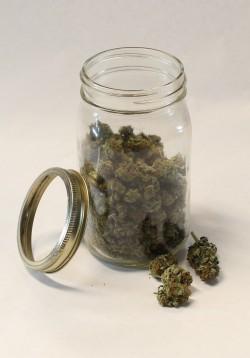While Oregon legislation going into effect makes medical marijuana both legal and accessible, students, faculty and even visitors who bring the drug on campus could face consequences.

Last summer, House Bill 3460 was passed, allowing medical marijuana card-holders to find legal outlets for purchasing marijuana, and allowing Oregon Health Authority to register medical marijuana dispensaries. In tune with that law, three medical marijuana dispensaries – Bloom Well, High Grade Organics and CANNAbend – opened up in Bend.
While medical marijuana is making progress in its initiation to Central Oregon, the drug is not approved at the federal level. That difference in legislation poses some issues for Central Oregon Community College, according to Jim Bennett, campus public safety coordinator.
“We receive federal funding,” Bennett said. “So whereas medicinal marijuana cards and authority exists in the state, it doesn’t on the college campus.”
Campus Public Safety is not the only COCC department to limit the use of marijuana, according to Aimee Metcalf, assistant director of College Relations.
“COCC is a drug and alcohol-free campus and medical marijuana is prohibited,” Metcalf said.
In the February-March Oregon Legislative Session, lawmakers discussed how to put full legalization of marijuana possession, transportation and production on the ballot for the next regular general election. Under Senate Bill 1556, the bill would have allowed voters to approve or reject legislation for Oregonians over 21 to use marijuana. As of Feb. 17, the bill was stalled in the Senate Committee on Rules. While SB 1556 did not meet with success, attempts at future legislation in Oregon for marijuana have been discussed.
Currently, the Oregon Medical Marijuana Act does allow medical marijuana usage in Oregon. But for COCC, while marijuana users are allowed on campus, possession is not, according to Bennett.
“[Users] need to realize, ‘I could go out into my home that’s one block from the school and use it there, because I have a lawful authority to possess it.’ But you can’t use it here on campus,” Bennett said.
Campus Public Safety does a yearly case count on narcotics use on-campus, and for the past three years has been seeing an increase. For 2008, the number of narcotics cases for the year was nine. That number has gone steadily up, staying at 15 for 2011, and spiking to 33 cases in 2012. And while 2012 saw a decrease to 21 cases, in the first two months of 2014 there has already been nine cases.
While the number is growing, it may not be near the total number of cases where marijuana is used on campus, according to Bennett.
“It doesn’t mean we’ve caught every instance where something has occurred,” Bennett said. “It all depends on the officer being at the right place at the right time, someone reporting it, someone seeing it.”
While marijuana usage on campus may be rising, the rest of the year will tell if that rise continues. New stores like CANNAbend may encourage additional marijuana usage on campus, but summertime usually shows a decrease in cases, according to Bennett.
“It’s all relative because you see it go down to almost zero three months of the year during summer,” Bennett said. “So saying, ‘Wow, it’s the first few months and you’ve had nine’ is not necessarily meaning that there’s some great increase.”
Campus Public Safety has been cracking down on narcotics usage on-campus, but part of their ability to do so might be limited. According to the Oregon State Police website, in the U.S., “Unless you are operating a vehicle (bicycles included), you cannot be cited for consumption of marijuana.” While legal and illegal pot-users have to keep marijuana out of their pockets when at COCC, they can still have it in their system and not face legal consequences.
Even those who possess marijuana under state law may still be able to carry the substance without facing rigorous penalties the first time, according to Bennett.
“Obviously if it’s something that they’re not supposed to have, it has to be confiscated, and certainly they can be prosecuted for illegal narcotics,” Bennett said. “When it comes to someone that has a legitimate, valid medicinal marijuana card, our goal is just compliance.”
While marijuana at the state level is seeing change, unless it is approved federally, Campus Public Safety expects to maintain a no-use approach.
“Certainly people that have lawful authority to possess it now have new access points in Bend,” Bennett said. “We want to put the word out that … no type of marijuana or narcotics is permitted on campus.”
Junnelle Hogen
The Broadside
[email protected]













